#tdp... Hat?
Explore tagged Tumblr posts
Text
Really hoping Hat takes a shine to Runaan.
Seems like the kinda thing that would make Runaan pouty.
Which I enjoy.
#callum gets a pirate hat#and Runaan gets a Hat hat#also Sneezles sneezing in his face a lot#Jellybug is indifferent#the dragon prince#tdp#callum#runaan#tdp callum#tdp runaan#tdp... Hat?
169 notes
·
View notes
Text
i love how callum's choice of "classic spells to demonstrate to a non-believer that i can indeed do magic" is always aspiro when it is least convenient, and fulminis that one time he was just pissed off
#like aspiro ended up with a nearly lost life-tethering feather and a nearly eaten hat when both times fulminis would've done the job#and then fulminis when aspiro would've been perfectly fine but nah he was trying to impress ibis#“oh i can't do magic?? fucking CAN'T I???” *blows him up*#ttm#through the moon#sea legs#dragonguard#tdp s3#tdp s5#callum#tdp callum#tdp#the dragon prince#continuethesaga#giveusthesaga
757 notes
·
View notes
Text

Big week for himbos
#tdp#Soren#I was already drawing the beach one when i realized his name also worked with ‘Enough’#this is one of my greatest epiphanies of all time#also he has a Hat!!#like in the movie#I love this good job ne#tdp art#the dragon prince#barbie movie#tdp s5#tdp spoilers#kind of cause of Hat#dianadraws
4K notes
·
View notes
Text


389 notes
·
View notes
Text
Honestly it’s pretty funny to think about Soren and Hat in about 7-12 years because Soren has greatly miscalculated the consequences of training and encouraging a glow toad to sit on his head
#this message is brought to you by girl who thought it was cute her kitten wanted to perch on her shoulder until he grew up to be a huge boy#who would insist on being her scarf and clawed his way up her back daily to wrap around her shoulders#jelly tarts#the dragon prince#tdp soren#tdp hat
240 notes
·
View notes
Text
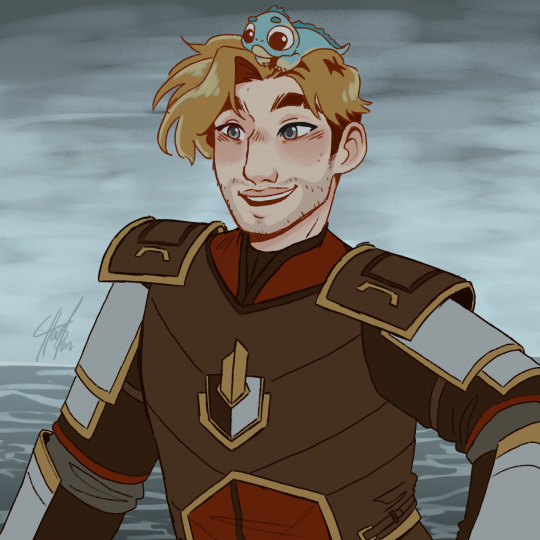
I love his slay little stance. (And his slay little hat)
#is he . yknow. [glowtoad on his head]#his armor is so fun to draw I’m obsessed with him#next time I draw him he’ll have a cane or my name’s mud#if I ever post something and I’ve rendered more than the face and hair call someone. it’s not me#the dragon prince soren#soren tdp#tdp soren#tdp#tdp s5#tdp fanart#Soren tdp fanart#the dragon prince#tdp hat#not to pick favourites but I’m a big hat fan#i see myself in hat#that’s me but like as a glowtad
786 notes
·
View notes
Text


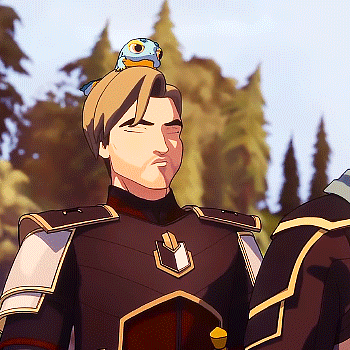

Soren and Hat
Bonus:

#the dragon prince#tdp soren#tdp hat#listen they are so cute and soren deserves a little emotional support buddy#giveusthesaga
356 notes
·
View notes
Text
Sometimes you’re minding your business when you’re hit with the realisation that Corvus and Hat met in the mushroom episode

This was his first ever time seeing this little baby glow toad. No context, no nothin’

Apparently the glow toad goes on Soren’s head, not Zym’s

By the time they’ve made it to Zubeia’s crash site, Corvus knows Hat by name - and that the poor baby has inherited Soren’s lack of impulse control
#he instantly saw these two together and thought “dear god they’ll kill themselves without my help”#the dragon prince#tdp hat#tdp corvus#tdp soren#sorvus#continue the saga#give us the saga#greenlight arc 3
145 notes
·
View notes
Text

"Who needs a crown when you have Hat?"
I bring to thee... the first of TDPtober! Day 1: CROWN
Here is post for reference.
#the dragon prince#tdp#tdp fanart#tdptober#the dragon prince fanart#tdp ezran#ezran tdp#tdp hat#ezran#tdp art#inktober#inktober 2024#traditional art#artist on tumblr
180 notes
·
View notes
Text
The baby Baits

#tumblr fyp#dragon prince#tdp#continue the dragon prince#continuethesaga#art#tdp art#tdp baitlings#baby glow toad#tdp jellybug#tdp hat#tdp sneezles#muneshadowpawblogs#tdp callum
60 notes
·
View notes
Text

Template:

#jojos bizarre adventure#jjba#battle tendency#joseph joestar#trigun 98#trigun maximum#trimax#vash the stampede#gachiakuta#zanka nijik#witch hat atelier#wha#agott arklaum#revolutionary girl utena#anthy himemiya#rgu#the dragon prince#tdp#tdp callum#draw a character you like#artists on tumblr
54 notes
·
View notes
Text
The Point of The Dragon Prince: The Phoenix Motif
Intro
I don't think it's a surprise to anyone that The Dragon Prince is about cycles.
It's in the dialogue and the visuals, with the series itself being an exploration about the Cycle of Violence and how to break it / the Chains of History. Framing and spells and character choices continually repeat over and over again, as @kati-corn beautifully points out with their parallel compilations, sometimes drawing from 4+ seasons at once, such as in TDP's repeated trial scenarios (3x02, 4x06, 6x09, 7x02, 7x09).
The cycle I'm going to talk about, though, is a little different. Cycle 2.0, if you will, otherwise known as the Phoenix Motif, is decidedly different from The Cycle the series has always drawn explicit verbal attention to. Specifically, rather than The Cycle of Violence that is inherently 1) destructive, 2) negative, and 3) needs to be broken, the Phoenix Motif presents something that is more positive to neutral leaning. Not all cycles are bad, after all — take the cycle of the seasons for example — and this is something that TDP itself even addresses, loosely, within the Moon Arcanum in Through the Moon:
LUJANNE: There is a cycle in the world. Life and death. It is at the core of all things. The moon embodies this cycle. Bit by bit it will fade away; then bit by bit it will brighten. [...] Death is frightening. Birth can be as well, yet there are the two things that connect us all. Kings and commoners, rich and poor, elf and human — each is equally vulnerable in the beginning and the end. Let that fact be humbling. Let it bind us together. Remember that as life inevitably leads to death, so also does life comes from death. This is a cycle, not an ending. A phoenix dies, yet from its death it lives again. A phoenix is uniquely tethered in the both life and death, and yet it is like the rest of us: a part of the cycle.
3x06 specifically confirms this as well, with Ezran stating of Phoe-Phoe:
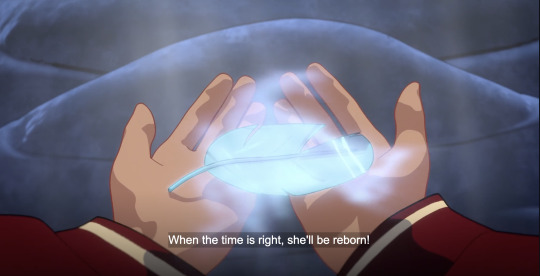
However, this sentiment of death and rebirth — perhaps even perpetual, eternal death and rebirth — should already probably be pinging something in your head.

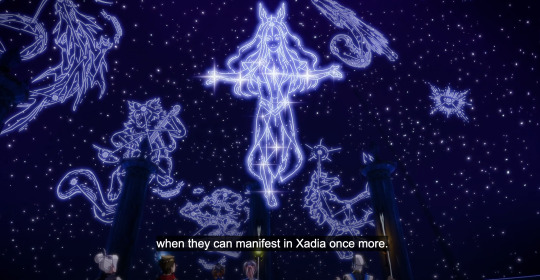
Now, in retrospect, this isn't exactly surprising. TDP loves to be really fucking literal, taking what would otherwise be abstract concepts and making facets of their world literally embody it. I remember after S2 or S4 thinking about how, if the thematic antagonist of the show is History, having a super old super ancient being — the embodiment of that history — as its endgame villain was really smart, honestly. Aaravos — and the Cosmic Council, thematically if nothing else — operating as antagonists and being literally cyclical, subsequently immortal beings? Yeah, it checks out like painfully well.
However, the more I though about this cycle — destruction as well as rebirth, death as well as life — I thought about how much it's been shoved in our faces consistently without even realizing, and with increasingly interesting implications. To the degree that, as it stands now, I'm willing to make a bet on Arc 3's culmination and wager what, indeed, The Thematic Point has been all this time — not only for the main trio and Aaravos, as this meta initially set out to focus on — but for the Dragon Prince as a series in its entirety.
With that out of the way, let's get into it.
When The Time is Right
It's sort of an accepted fact, especially in literature, that near-death experiences can radically change a person's outlook on their life. Death, additionally, often represents the abyss or a pivotal transformation point that leaves the old self dead, with a new self surviving (or thriving) that has been fundamentally altered. Death can be the end, or it can be a transformation, provided you get a second chance.
HARROW: I may not have long, so I am forced to ask myself... (2x06)


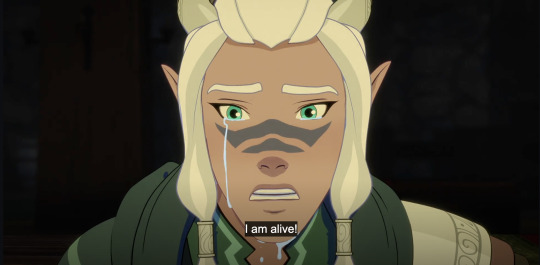
RUNAAN: I have a family I love. I have so much to lose, the very things I took from you. (7x09)
For Viren and Runaan, at least, this has fully come to fruition. Both engaged in dark work that led to their demise. Both were saved by their daughters, and both were fundamentally changed by their 'deaths', resolving to stop treating others, or themselves, like they were already dead ("They're gone, Amaya! Captured by a Moonshadow elf! If [the princes] aren't already dead, they will be soon enough!").
Both ultimately resolved to stop chasing revenge (or in Viren's case, power) in favour of trying to prioritize their families; both returned to Katolis, fell to their knees before Ezran, and swore they had changed. That they could make amends and would, if given the chance.
Viren dies and then is reborn, fundamentally different, and then dies again with his heart literally on fire and surrounded by flames. Runaan, meanwhile, requires for the fire in Ezran's eyes to be doused, and is brought out of water, not fire, but the point still stands. Their destruction was pivotal, if not narratively crucial, to being recreated as better versions of themselves.
Staring down limited time, much as Harrow had before him, caused Viren to ultimately realize his old friend was right: "I am a servant." Runaan's second lease on life caused him to realize he'd put his family through strife and perpetuated an awful cycle for well-intentioned but twisted reasons, and that he had to stop. He had to change.
HARROW: These moments of greatest strength look like weakness to those who don't know better. For a long time, I didn't know better.
I will not make the same mistake again. I will not watch another daughter die.
This three very similar — servants to their causes, devoted to things greater than themselves, lost in violence of the cycle they're perpetuated, granting their children immense and burdensome responsibilities — and very different men also tie into Lujanne's statement. Viren and Runaan were both, seemingly, born commoners, while Harrow was born a king; he was given everything, whereas Viren strove not to be and Runaan trained himself to be, alternatively, "nothing". Yet the cycle of life and death, and ultimately the hope their children could be different from themselves (expressed particularly blatantly for Harrow and Viren) equalized them all. As I've said before, the Cycle of Violence creates similarity — with the Phoenix Cycle/Motif doing so in a more full circle, potentially positive manner.
It remains to be seen whether Harrow will indeed be released from the bird (a quasi-literal phoenix, if you will, if we're speaking about on-the-nose symbolism); I could personally see it going a number of ways. It's also not clear how much he will have changed upon release—Viren changed somewhat quickly and gradually following his ressurection, whereas Runaan did much more of 180. Unlike Viren or Runaan, Harrow didn't have to die or be trapped to reach his epiphanies; he reached them on his own before the actual acts had happened. Staring down the barrel of a metaphorical gun was enough for him, so it stands to reason there's not too much internal change to be had besides "Holy shit has the world changed" and an adjustment period.
[Sidenote: This is, I think, another aspect that Karim differs in. On a textual level, Karim is irredeemable, because as discussed in more detail elsewhere, due to him seeing his loved ones as JUST his enemy and no longer as his loved one in addition to being his enemy. His sister becomes just his enemy and a false queen, not those things and his sister; child is just his heir, not his child and his heir.
Karim wishes to set the world on fire, but doesn't understand that he'd be transformed alongside it; his complete aversion to change even when everyone else (Janai, Miyana) can and does adapt to it keeps him stuck.
Karim is the only "father who fucked up by disavowing his child's life" (hi Runaan, hi Viren) who doesn't come back from it, too. On a subtextual/symbolic level, I think it's interesting therefore that he's the only one of the 4 that doesn't have a death. Like Harrow or Runaan, he's imprisoned, but he's never believed to be dead by himself or anyone else; the closest he gets on a literal level is in 4x09 where, like Runaan, he's on his knees as he says "Finish this," but is spared and (eventually) imprisoned instead. However, Karim is offered a symbolic death of sorts — to relinquish his name, whatever that precisely means, in 7x03 — one that he readily dismisses. He never has to grow because he never really conceptualizes, on a certain level, his own mortality: either he's not thinking about it (and the subsequent possibility for failure it would entail) or never muses over it. We're going to circle back to this, but for now...]
That said, I think these Harrow-Viren-Runaan are probably the most obvious example of this death-rebirth motif in the show, next to Aaravos or actual Phoe-Phoe. They were, at the very least, what immediately came to mind when I thought about what I wanted to be in this meta.
The next section, I think, is a little more interesting.
For a Thousand Years
Archdragons live for a long time. Like, a really long time—3,000 years basically minimum, potentially 7,000 years maximum, but who knows. We know that Sky Archdragons only lay an egg every thousand years flat out (1x05) which does not bode well for not living an ungodly long amount of time in general.
One of the things that set me on this meta path, I think — and something this meta has helped me consolidate that I kinda knew I was dancing around but not quite able to hit upon or fully bring together — is a previous meta I wrote looking at immortality in TDP. Simply put, TDP doesn't have a very positive view on immortality (more on that later) as most of the characters who are immortal or at least have enduring lifespans don't seem to like being alive for that long very much.
Sol Regem is deeply depressed and bitter; Rex Igneous laments that objects all turn decrepit over time and seemingly has no companions he actually cares for. The Draconic Royal family seems to fare uniquely better precisely because they have each other.
Likewise, all three also fall under the Phoenix Motif.
Zym is believed to be dead from within the egg (very bird like) but is brought back to life (1x02, 1x09) from his discovery and his hatching. He is also fundamentally changed as a result of being rescued and bonding with elves and humans (particularly Ezran) as opposed to just bonding with Xadians. (More on Zym and his ultimate potential narrative purpose here and how being stolen/saved might've saved him and the world in other ways, too).
Avizandum dies (3x06) but his spirit is resurrected/brought back by Ziard and Aaravos under dark magic necromancy. He ultimately dies again protecting his son (7x09) but successfully this time. He also ties into the Fathers' Rebirth Theme of in the past prioritizing conquest and/or power (he loves to destroy human armies, "it makes him feel big and powerful") after his son came into his life ("this is a special day of life, do not force me to make it a day of death" / "that's why Thunder was willing to spare us. He had to get back to that egg"), which parallels Harrow-Viren a bit more than Runaan, but bear with me.
Zubeia is effectively dead when the trio shows up in 3x08, given that we've known she's actively dying of a broken heart since 3x04. (She has a similar terrible slumber in 5x09 that she just manages to recover from thanks to Mukho, but that is treated less like death and doesn't fit the motif quite as well because she doesn't have a big personality/life change afterwards. She does, however, post-3x09, abandoning the cycle of revenge (1x01) to actively pursue peace and breaking the cycle instead (S4 onwards) to the point she dies for Zym, yes, but also to save people whose lives were upended by her choices: Callum (thematic dark mage still deserving of salvation in this instance), Ezran (a former target), and Rayla (assassins sent to die) + others as add ons of similar ideas (Runaan, etc).
But again, this is all... kind of background stuff. At the very least, it's a consistent pattern bordering on theme (particularly for the group of fathers), but it's not really in the foreground in any meaningful way for the centralized main characters (and trio and co). Not even quite subtextually yet, either.
And then it Is.
All of Us May Be Reborn From Darkness
Season seven is when all of this started clicking for me. I don't know if it's because things finally moved into subtext territory, or because S6 had primed me to expect something like an obsession arc from Callum (a la the fathers' group) in future seasons or what, or even if it's just because the show ramps up the Phoenix Motif to much more obvious levels with the trio and Aaravos, but it was very exciting and beautiful to behold, I think.
Let's break it down piece by piece, starting with Ezran, as he's the most straightforward / blatant. I've talked about Ezran's interplay wth the Phoenix Motif in greater detail here, but I will go over the key points:
In 7x01, Ezran's kingdom and identity as king ("and as a king, I choose love over strength") is burnt to ashes. This is directly verbalized: "King of what? King of ashes?" + "He's not himself right now" (7x02).
Ezran experiences a significant loss (the remainder of his True Heart) which literally alters him
Ezran continues to change, pursuing weapons for most of the season (7x03—7x09)
Aaravos' death "set(s) the world on fire" + the fire reflecting in Ezran's eyes in 7x09 much the way the fire filled Aaravos' eyes when talking about his plans ("I want them to suffer. I want them to hurt")
Ezran chooses, therefore, to not be a king of ashes in forgiving/sparing Runaan. He also works on building Evrkynd (and Katolis), literally rebuilding the world from ashes.
Wat's presented above are the broad strokes / overt symbolism of Ezran's arc from a structural / plot standpoint, and we see the rest of the trio be reflected in this. Rayla probably gets the second most overt one during her trial in the Silvergrove, hence the title of this section:
Like the moon itself, all of us may be reborn from the darkness. To achieve that rebirth, you must prove yourself worthy of absolution and forgiveness.
This is stacked on top of a few different things, of course. For starters, Rayla as an assassin carries the implicit "I am already dead" framing that Runaan carries explicitly through dialogue. This thread of hers isn't necessarily resolved by the end of the season even if Runaan's is, but I expect hers to bleed over into arc 2. There's also the idea of rebirth, which is spelled out more explicitly in 4x01 being titled "Re-Birthday" in reference to Viren.
The third layer, if you will, is the more direct one: her status as a Ghost (dead) seeking to be reborn into her community. And, by the end of her trial, this is precisely what happens.
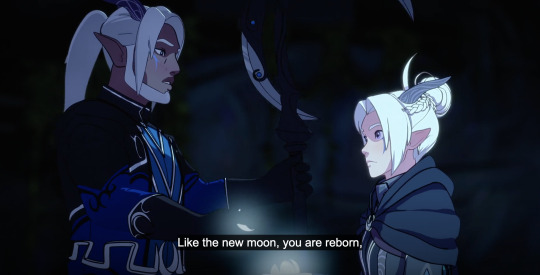
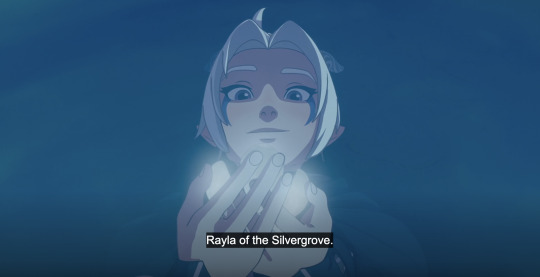
Rayla's rebirth from darkness (the new moon, and perhaps a symbolic state of total uncertainty in comparison to half-truths) also sets up Callum's. Not only does the dialogue in her trial scene echo the poem from his father in 6x03 ("And newborn sparks born of the dark"), but it also aligns with his choice of whether or not to use dark magic again. Granted, in some ways, his rebirth and resumption of status happened in 6x06—that maps on better to Rayla's trial in terms of outcome and symbolism. You were once exiled/corrupted, this meant that you were already dead (a Ghost, Callum's "kill me" request), and upon facing your truth and/or remembering who you are ("Rayla of the Silvergrove" / "Find the one deep truth") you are brought out of that darkness and into light as a reforged form of yourself. Rayla can now be seen, Callum though blindfolded saw her, and reintegration happens: Rayla is let back into her village, she and Callum fully resume their relationship on mutual terms.
She's brought home in a physical and emotional sense, reconnecting with her community and with her changed self. In her time away, she's learned a lot of lessons about justice ("A life for a life? Is that justice?" / "No one should have to spill their blood for justice. No one"), sacrifice/suffering ("No amount of suffering, yours or mine, will ever bring him back"), and asking for help / depending on her family (5x04, 7x04). Arguably, 6x06 offers Callum something similar if you view Rayla as his home: finding her as his one truth restores his body/soul (physical) and provides emotional clarity (emotional) to bring him back to himself and her (as a fundamental part of himself) as a reunified Home ("my home now is wherever you are").
But I said trio in S7, not Ezran&Rayla in S7 + Callum in S6. So, what's going on with him in S7?
Callum's thread with the phoenix motif is one that is both very much evolved forwards in S7, yet also left hanging more so than any of his counterparts. While you can look at S7 Ezran (7x01—7x09) and S7 Rayla (7x01-7x04) and go swiftly from point A (destruction) to point B (rebirth) across the season, Callum's is less straight forward in some ways because his destruction-salvation is both created and 'resolved' within 7x09. There is a very quick turn around from "I'm going to destroy myself with dark magic" to "I don't have to die actually" and even then, Callum arguably leaves the season in the worst place out of the trio, given that he's still corrupted.
This is also, in some ways, where the trio's phoenix motif starts unravelling, however, because as much as S7 began that motif for them with a neat little bow... Arc 3 looms on the horizon and honey, they've got a Big storm coming. This is for a few reasons.
The first is that Ezran is the only one with an explicitly ideological rebirth within the season. As mentioned before, he has the most explicit and complete journey within the phoenix motif model. He's destroyed (7x01), fundamentally physically altered (7x02), and then experiences a complete rebirth wherein he walks out changed and still changed for the better (second half of 7x09). Whereas before Ezran chose to believe people could be good because he believed they fundamentally were, 7x09 Ezran now chooses to believe people can be good even now that he knows fundamentally they are not or may not even want to be, or at least not always. (A mood, bud.) Being good is an active, continuous choice, for everyone now—including himself: "I'm going to forgive you" is a choice, not necessarily one that reflects your current feelings.
Conversely, Callum and Rayla are far more the same person at the end of season seven as they were at the beginning. This is lampshaded directly through their dialogue, with Dark!Callum’s argument boiling down to Callum’s lack of confidence in a non-dark magic route (“If you’re so sure, why did you save it? [...] You know you might need me after all”) for something that already happened post-purification and in 6x09 in keeping the coin. Rayla, too, harkens back to concepts from many previous seasons, most notably her assassin vow all the way from 1x01: “My heart for Xadia!”
Where Ezran is pulled and pulls himself explicitly back from the brink when given another chance to remake or unmake his choice about Runaan, Rayla and Callum (and Zym) thus far have not been offered a do-over of their choices in 7x09, whether literally or symbolically. That may be in Arc 3, though it’d make sense: if Ezran got an ideological rebirth, them having new ones would fit both the Phoenix Motif pattern and trajectory. Callum, in particular, is primed to completely revolutionize but one thing is for sure: all of the trio is going to be haunted by Aaravos’ inevitable return and the beginning of his (life) cycle anew.
And with Ezran having had one complete ideological destruction and rebirth cycle... what about Callum, Rayla, and Aaravos?
Your Deaths Mean Nothing (Aaravos)
Here’s a question: what makes a sacrifice meaningful? Must a sacrifice be made by an entirely willing, self-aware participant? (“A child will die.” “Yes.”) Must a sacrifice be fulfilled / permanent to have poignancy?
If you cannot ever die in a meaningful way, can you ever live or sacrifice in a meaningful way?
This emphasis on morality as a prerequisite for meaning was something that was kicking around in my head after S6 since we'd learned that Startouch elves both could (Leola) and couldn't (everyone else) permanently die, or at least that killing them permanently was exceedingly difficult... as well as the contemplation on mortality based morality from other shows like The Good Place. This wasn't, at the time however, something I thought we'd really dig into. After all, there were lots of good, other reasons to have Aaravos and Startouch elves function this way: it made Leola's death more tragic, it upped the ante of how to kill Aaravos immensely, and it helped Aaravos embody the themes of History and the Cycle even further by having him be an ancient walking piece of history whose lifespan was literally a cycle, as mentioned previously.
Season seven, then, shifted things.
For starters, it confirmed that Aaravos seemingly isn't concerned with keeping his actions secret from the Cosmic Council ("Are you watching?") / other Startouch elves, which doesn't exactly make sense with what we currently know. After all, we know that the Startouch elves could kill Leola permanently, and Aaravos was more powerful back then than he, seemingly, is now. Shouldn't he be concerned? Couldn't they kill him the same way they did Leola if they wanted to?
Well, hm... what if they can't? What if through dark magic or other means he's preemptively removed his own immortality? (More on this theory here.) Alternatively: if the Cosmic Council can still kill him, and Aaravos wants to kill them, we still kinda end off on the same place.
Either Aaravos has made himself immortal in a way they are not, dooming himself to being unable to ever die by proxy of removing his own minimal mortality that Leola had, or he will kill anyone who could kill him, and be doomed to exist forever or die by his own suicidal hand.
“This world is an instrument of pain, of torment. To exist in this world is to suffer. Even death is no reprieve.”
Aaravos’ views on the world and sacrifice, however, are immediately juxtaposed by Ezran’s and the Archdragons, set up all the way back in 4x08.
N’THAN: ... give [Rex Igneous] your gift of sacrifice and hope for the best.
EZRAN: We offered gifts that meant a lot to us, but the truth is, they don’t mean anything to you. (4x08)
AARAVOS: And what will your sacrifices buy? Mere moments of peace before I return to a world without you? Your deaths mean nothing.
EZRAN: They have given us a great gift: a chance to keep on living, keep trying to be better. (7x09)
Avizandum and — particularly — Zubeia are able/allowed by the narrative to lay down their lives for their son, a choice the Cosmic Council robbed from Aaravos. Their deaths are permanent, and their gift, as Ezran identifies, is a sacrifice that should not be wasted: “life is precious, life is valuable” / “I have a family I love. I have so much to lose”. While Aaravos says that their deaths mean nothing because of the impermanence of staving off his return — because to die or resist is futile, to live is to suffer — Ezran asserts the opposite: that their deaths and the victory it afforded his family, temporary as it may be, alternatively means everything to him (and within the broader narrative) precisely because life is worth living... and if you believe that life is worth living, giving it up is indeed a sacrifice.
So now onto Aaravos’ death in 7x09. He chooses to send Claudia away rather than risk her dying alongside him, but he doesn’t die or allow himself to be taken down in order to save her, or arguably chooses to die consciously at all. His explosive end is not, perhaps, exactly what he had in mind when coming to corrupt the sun, but it’s also an immense setback. If anything, it’s the opposite, given that it allows him to get rid of the Archdragons, weaken Xadia, and leave his human foes (Callum and Ezran in particular) wonderfully paranoid about his return. (More on Aaravos’ master plan here, for anyone interested.)
Aaravos, after all, doesn’t care about anything so much as he cares about getting his revenge. As Terry identified, his love has been twisted largely beyond recognition, enabling him to destroy the world and creatures/people his daughter once loved so much. He’s willing to endanger and manipulate Claudia and anyone else around him in order to achieve it. He’s an immortal being beset with grief, and therefore exists outside the cycle of life and death precisely because he’s not bound to it.
At least, that would be the easier way of looking at it... because while that was my initial line of thought as of season 6, Lujanne’s description of the Moon Phoenix (our thematic microcosm for the Startouch elves) sits in direct opposition to it:
A phoenix dies, yet from its death it lives again. A phoenix is uniquely tethered in both life and death, and yet it is like the rest of us: a part of the cycle.
Aaravos and the Startouch elves — regardless of if he’s removed his ability to die, regardless of if they can kill each other — do not sit outside the cycle, separated from everyone else by their immortality. Instead, they are as interwoven as everyone else. And as noted, many of the show’s characters have had emotional or plot related Phoenix Motifs: Aaravos dies in a fiery explosion, only to return — like Phoe-Phoe — when the time is right.
This is also, of course, connected to what we’ve already discussed regarding fathers. Runaan and Viren are both saved by their daughters, brought out of death and into life, and are fundamentally changed as people because of their experiences. Their death and ‘resurrection’, as noted, allows them to change, as does Harrow staring death in the eye make him deeply rethink his life choices. Alternatively, Karim — who does not care for his future child(ren), does not come back from this brink, and who rejects the symbolic death offered to him (relinquishing his name) — does not change and meets a grisly end.
What I am saying, then, is that while having Aaravos get out and then be given a soft reset so we can have another timeskip works perfectly fine as is from a plot standpoint... I wonder about how meaningful it’d be if they don’t Do Something with it for him from an emotional standpoint, too, the same way Viren, Runaan, and Harrow underwent (though Harrow could still, admittedly, have further stages to go through). After all, TDP is very good at having what looks like 1-3 things be actually 6-9 things when seen retrospectively (re: Aaravos’ master plan meta) so I can’t imagine that Aaravos’ death and return won’t be that, too. And there is, to some capacity, no real reason to have Aaravos care about Claudia somewhat genuinely in season 7 if we’re not going to do something with that; he didn’t need to in order for Claudia to form a deep attachment and alignment with him. We could’ve had little smirks as he continues to use Leola’s memory to manipulate her (the way he does in 6x09, minus the smirking) and while we get spades of that (“I am her father now and she is my daughter”) and should see everything he says to her as a double edged sword... There is truth to “I will not watch another daughter die” that will likely stick with him and continue to grow.
Remember how I said Callum, Rayla, and Aaravos have lived through the plot version of the Phoenix Motif, but not fully the ideological/emotional one as of 7x09?
Arc 3 would be the perfect time, then, for the three of them to get an ideological rebirth journey (similar to Ezran in season 7, or Viren in arc 2, or even Soren in arc 1) to reflect the way Xadia as a whole will be.
So let’s talk about it.
We’ve All Made Mistakes. We We Don’t Have To Keep Making Them (or The Point of TDP)
Again, I don’t think what I’m saying — characters in TDP must break the cycles of violence, destruction, and death, and choose creation/life/love over it — or that it’s a repeated pattern is new information. As demonstrated above, we’ve seen this pattern over and over again in the show because it’s kind of what it’s all about.
Characters in TDP rarely become something entirely brand new, instead moving forwards in order to move backwards at the same time, and become truer, better versions of what they wanted to be all along. For an oversimplification, Soren goes from (bad) crownguard to enemy to (good) crownguard in arc 1 (“I am a crownguard, and he is the true king!”; Viren goes from a good father / high mage (1x01-1x03, flashbacks) to bad ones (1x04-5x09), and then back again (6x01-6x08). Sometimes this follows a linear enough progression, but sometimes it doesn’t.
If we view character journeys through the lens of the Big Lessons the characters have to learn (i.e. Rayla learning she doesn’t always have to sacrifice), arc 1 and arc 2 demonstrate immense growth and regression for her simultaneously. She’s moving forward — she’s letting people in, letting them help her, shedding her assassin identity, coming back to Callum — and moving backwards — keeping secrets, being more jaded, “My heart for Xadia,” continuing to be an assassin by sacrificing herself (3x09) and particularly others (5x01, 7x09) — at the same time. By the end of the series/S10, I expect she’ll finally be the protector she’s always wanted to be without needing to sacrifice herself or others. After all:
TERRY: Maybe he saw there was another way forward. One with less darkness and sacrifice. It’s never too late to change.
The Archdragons’ sacrifice is beautiful and meaningful, but Aaravos isn’t entirely wrong: it’s a band-aid on a bullet-hole situation that is just a temporary fix, and from a narrative perspective, it’s still a sacrifice, the thing we are trying to avoid. While the Archdragons sacrificing themselves to save everyone else — or Viren sacrificing himself through dark magic in 6x08 — was the right thing to do, it was still a tragedy. Aaravos’ death in 7x09 isn’t to anyone but Claudia because Aaravos doesn’t care about his life: his life has no meaning other than revenge, and therefore his death has no meaning other than revenge, the same way Karim’s death by Aaravos’ hands is utterly meaningless (if also a loss to his family).
If your life is devoid of love and meaning, then you have nothing meaningful to sacrifice and die for.
So what would be the biggest change for Aaravos — one who, as far as we know, cannot die and therefore cannot live nor sacrifice meaningfully — to have? For his life to take on new meaning.
AARAVOS: To go on without her would mean an eternity of pain. But in that moment I chose to live, and my life took on new purpose.
To have love; to have things you don’t want to lose. That you don’t want to sacrifice. To want to live. To want to move forward, truly forward, rather than constantly looking back at the past and making the same mistakes (darkness, death, sacrifice) over and over again.
EZRAN: You say that I should believe you because you are great and ancient, that I’m too young to see clearly, but I think it’s the other way around. You’ve spent so long seeing the world through a lens of hate that you can see any other way to get what you want. But I can.
If Arc 1 and Arc 2 are both ultimately growth and regression for the characters involved, then it would stand to reason that Arc 3 has to have a final closing note of emotional growth and zero regression. But is that really possible? As stated, things in TDP don’t become totally new: Soren becomes a true crownguard, Viren becomes a true father and high mage, Rayla or Runaan become true protectors of the collective good, etc. Even Xadia as a continent will not be something radically different from what it was before: elves, humans, and dragons used to all live together, and humans had primal magic. What we’re working towards in present day canon is, on the surface, the same as what the world had before... and it didn’t work, leading to thousands of years of violent fallout.
A better way to phrase it, then, might be focusing on TDP’s plot and character structure moving forward into Arc 3 not as growth paired with a lack of regression for once, but as a total restoration arc. Of getting back to the good places characters or societies had left — integration, reconciliation, primal magic — but as a fully completed whole: no hierarchy, no dark magic, no darkness or sacrifice.
To see another way — “I see a different path!” — and to walk it in its entirety as an entire narrative. To fix what was actually broken in Xadia, to realize condemning the full Cosmic Council or Aaravos to death over a world they never cared for is not the path forward, but to create caring and opportunity, to enact verdicts with “mercy and compassion” (4x06) and void of cruelty (6x09).
For characters, like others in the narrative and Xadia itself, to become a truer version of what they always wanted to or said they would be. For Aaravos, that would mean being an actual ally to humanity; for Callum, that would mean being an entirely primal mage; for Rayla, a true protector without sacrifice, etc. We don’t know what the Cosmic Order’s aims were beyond well, Order over chaos, but we can assume peace and tranquility. The peace and tranquility they tried to enforce was really indifference or neglect at best and outright hostile hierarchy and oppression at worst.
I don’t think we can just one-hit-perma-kill all the Cosmic Council members (though perhaps one), but ultimately the majority will likely stick around or change in some manner. To become what they were supposed to be, as Aaravos and everyone else does the same. An ideological rebirth from the bottom up and the top down to the point that we’ve gone from 1 to 100 and back again to square one, but Good, this time.
AARAVOS: [Leola] loved this world, and all its flaws.
EZRAN: There is no such thing as utopia. But with patience and persistence, we can build a better place.
Because Xadia is flawed and is broken, and has been all this time—and it is still worth fighting for and saving.
She’ll Be Reborn: A Conclusion
I made a lot of fancy promises early on, so as we wrap up the Phoenix Motif Meta, here’s a list of general predictions I think we can hedge our bets on if the show continues to follow this model:
Aaravos will return from his 7 year death and change pretty shortly after reuniting with Claudia and seeing how he’s changed. While he once dismissed or increased why Viren was concerned about Claudia’s path, Aaravos will now come to fear it in a similar manner (S9, S10). Insert the “you are destroyed by what you create, and grow to emulate what you destroyed” pattern here, the same way Viren initially disagreed with Kpp’Ar and Harrow, destroyed them through entrapment, and then realized both of them were right (big asterisk in Kpp’Ar’s case, but you know what I’m saying).
Ezran will uncover more about the Orphan Queen and why she didn’t kill Aaravos with the Nova Blade, going a step further to realize they shouldn’t try to imprison Aaravos again either.
Aaravos, Callum, and Rayla will undergo ideological rebirths, as will some of the Cosmic Council (thereby enabling Aaravos’ as well), as will Claudia (who’s been steadily associated more and more with fire as the series has gone along).
Fun bonus Harrow being literally reborn from a bird and/or Kpp’Ar getting out of his shiny coin
Leola herself will not be reborn, but what she represents will be taken up as a mantle narratively by the main group
A final restoration of an integrated Xadia (i.e. both halves of the continent, but also the Cosmic Council with mortal Xadia, too) and more easily accessible primal magic
And I don’t know: a world reborn from the ashes, for good in manner and in finality this time? I think it’d be fun to see.
#tdp#the dragon prince#phoenix motif#tdp aaravos#tdp ezran#tdp callum#tdp rayla#arc 2#s7#arc 3#the cycle#a narrative of love#analysis series#analysis#exciting thing number one (at least to me)#core thematic four#[in the girl with a cowboy hat vine voice] tdp i loove you. mwah#predictions#i'll come back here in 5 years and see what checks out#i also almost added a section on self eating but. might make another post for it tbh
41 notes
·
View notes
Text
Random TDP thought but I very much enjoyed that the animal sidekicks all have distinctive personalities and are characters of their own to a certain point instead of just being kinda there and serving as comedic relief sometimes.
Like. Many shows will just give characters animal sidekicks for the sake of it and not do much with them with counted exceptions (looking at you The Owl House, I love the palismen but other than Flapjack most of them didn't do much, not even Luz's). In TDP, meanwhile we are introduced to Bait from episode 1 and he's always had a very distinct personality even before the reveal that Ezran can understand animals (thus allowing for better chances at having animals express themselves and giving them personalities).
Bait is grumpy and rolls his eyes at the kids antics a lot, but he undoubtedly loves them all a lot and tries to help them to the best of his ability, be it by acting as a comforting presence when they're sad, literally acting in the face of danger (as part of a plan or otherwise) to help them or doing silly things to cheer them up like helping Callum cheer up Rayla in s7. He also has his own stuff going on, tho! I enjoy how easily jealous he gets of all the other animals (or dragon) when he first meets them only to eventually warm up to them and protect them or comfort them too! He's such a fun character and TDP wouldn't be the same without him. When I tell you I'd die for this glowtoad-
And then there's Stella! When they introduced her I was a bit worried this would be one of those instances where they give the female protagonist an animal sidekick just cuz the male protagonists had one and then do nothing about her, but turns out I was wrong! Stella is so charismatic and fun. She's cute and loving but also mischievous. She has turned out to be such a great help for the characters and I like how much she tries to help Rayla, sometimes to her own detriment like when she fell trying to catch the pearl. The fact that she has an habit to just grab whatever catches her eye is so funny to, little thieving monkey... The fact that her magic makes her a legit threat in combat caught me by surprise tho (THE FUCKING PORTAL DECAPITATION IN THE FINALE, HELLO???)
I can't say much about the bailings because they don't have that much going on for them yet. They're literal babies and their personalities aren't that distinctive in comparison + haven't had the chance to develop themselves yet, but it's nice they have at least some preferences displayed already like Hat just deciding that they want to be with Soren specifically from the get go or Jellybug having a sweet tooth. I'm also a big fan of Sneezles sticking with Callum and helping Stella make Rayllum real again (our MVPs for real those two)
Over all just. Idk, I really like these little creatures a lot, they make me smile whenever they appear on screen and I really enjoy the fact the writers made sure we'd have reasons to care for and get attached to them. They're a very important part of this show too, even if they might not be as noticed as the human, elf and dragon characters
#the dragon prince#tdp#tdp spoilers#tdp bait#tdp stella#tdp sneezles#tdp hat#tdp jellybug#little creatures who i love very much#no mentions of zym cuz even if he behaved a lot like a dog dragons still are self aware and have their own cultures#they're not pets nor animal sidekicks#anyway. long ramble lol#of all the character analysis i have and this is the first i decide to do#and I'd do it again i just think its funny#soratsu speaks
67 notes
·
View notes
Text






Since y’all liked the last batch so much… have some more Soren memes
#the dragon prince#Soren#tdp#hat#text post#text posts#meme#memes#personal#still ft some trauma. but less than before.#100
161 notes
·
View notes
Text
Just realized Soren doesn’t take Hat with him for their mission and im actually devastated that’s his baby
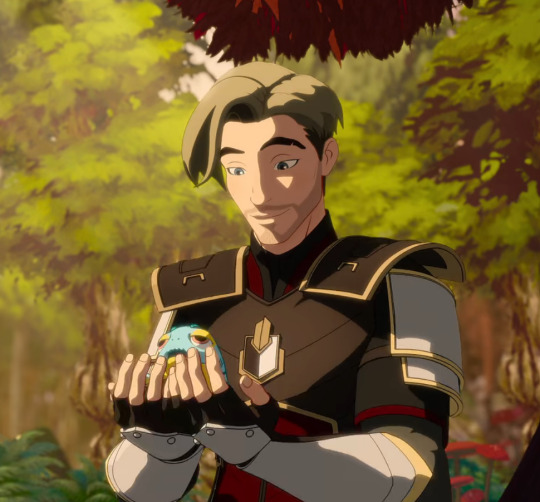
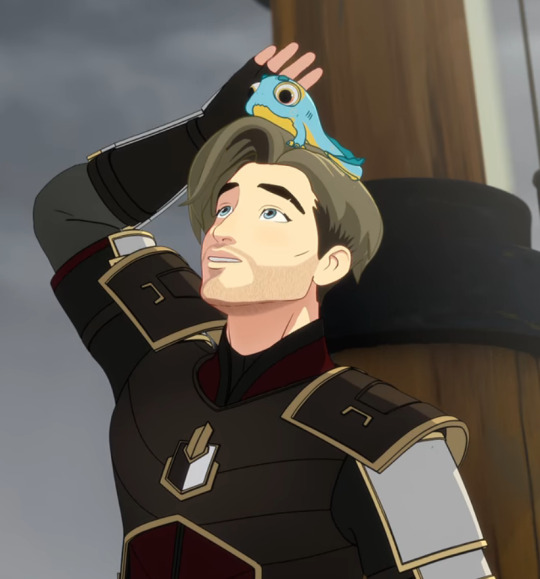

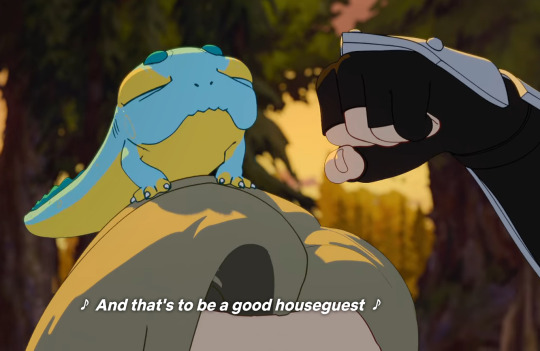
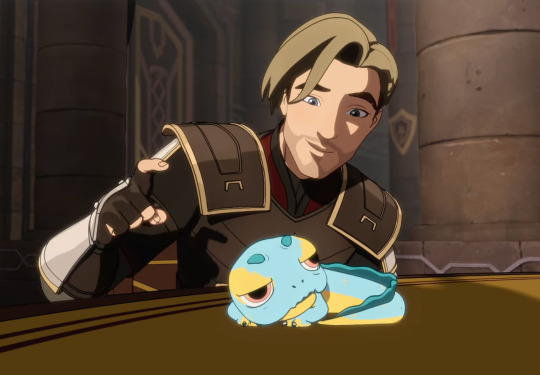
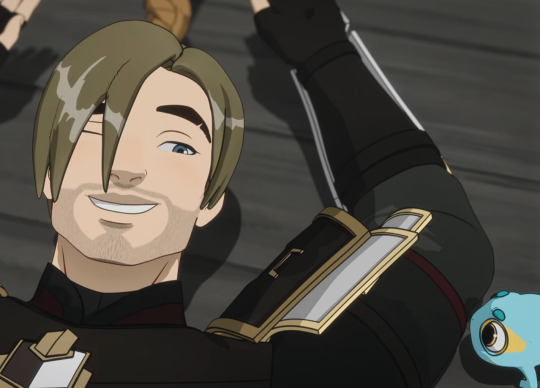
95 notes
·
View notes
Text
The way Soren doesn't get nervous when interacting with the baitlings until Hat decides, "you're mine now" is very amusing to me.
Like Soren doesn't mind them, he greets them happily and only gets nerveous when Hat jumps onto and climbs up onto his head. Is it because Bait used to dislike/distrust him? Or does Soren just not expect small animals to trust him so easily. Before this, Hat was only ever held gently by Rayla and Ezran so him trusting Soren enough to just chill on his head immediately was probably jarring.
#the dragon prince#soren#tdp soren#soren the dragon prince#hat#tdp hat#hat the dragon prince#soren and hat#hat and soren#also soren close your damn legs no one likes a harlot /j#their bond heals my soul#hat seeing this blonde guy working out and deciding#“youre mine now i call dibs” before jumping on him and climbing up onto his head#and soren just goes with it and seemingly brings hat with him everywhere#like in s6 when katolis was being attacked soren put hat in his shirt for safe keeping and hat didnt seem to mind at all#the cuties#giveusthesaga#continuethesaga#give us arc 3
52 notes
·
View notes